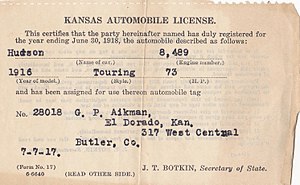
A vehicle registration certificate is an official document providing proof of registration of a vehicle. It is used primarily by governments as a means of ensuring that all road vehicles are on the national vehicle register, but is also used as a form of law enforcement and to facilitate change of ownership when buying and selling a vehicle.
European Union and European Economic Area
 Austria - Part 1
Austria - Part 1 Germany - Part 2Vehicle registration certificates issued in the EU/EEA countries may either a paper document or a smart card, as per Annex 1 and 2 of Council Directive 1999/37/EC.
Germany - Part 2Vehicle registration certificates issued in the EU/EEA countries may either a paper document or a smart card, as per Annex 1 and 2 of Council Directive 1999/37/EC.
In the European Economic Area (EU, Iceland, Liechtenstein and Norway), vehicle registration certificates are governed by the European directive 1999/37/EC. They consist of two parts, and can be either a paper document or a smart card. The information contained in these registration certificates includes:
- Vehicle registration number
- Personal data of the individual to whom the vehicle is registered
- Vehicle identification number (VIN)
- Engine specifications
- Exhaust emissions
United Kingdom
In the UK the document is the V5C, also commonly called the "log book". The document is issued by the DVLA and tracks the registered keeper of the vehicle. When a vehicle is transferred, exported, scrapped or had major modification (new engine, chassis or factors affecting the taxation class) the form is returned to the DVLA with details of the required changes, who then issue a new document with the details amended.
See also
- Vehicle title (or Pink slip)
- Electric vehicle conversion
- Vehicle registration
References
- Council Directive 1999/37/EC of 29 April 1999 on the registration documents for vehicles, 2022-03-24, retrieved 2024-09-15
- "Get a vehicle log book (V5C)".
External links
| Traffic law and safety | |
|---|---|
| Rules of the road | |
| Road user guides | |
| Enforcement | |
| Speed limit | |
| Moving violations | |
| Driver licensing | |
| Traffic violations reciprocity | |
| Parking | |
| Automotive safety | |
| Road safety | |